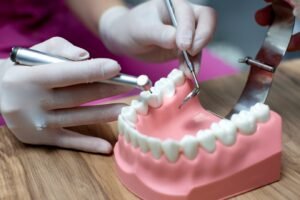The cost of a crown with insurance typically depends on your coverage plan. As we know—-most insurance policies cover about 50% of the cost after meeting the deductible. If a crown costs $1,000, insurance may reduce your out-of-pocket expense to around $500. You should always review your policy for specific details and limits.
Let’s grab all about how much a crown is with insurance.
How Much Does a Dental Crown Cost?
The cost of a dental crown typically ranges from $800 to $3,000 per tooth. This price variation is due to multiple factors. Understanding these helps you prepare for the procedure and manage your budget.
Crown material plays a significant role in the final cost. More aesthetic and durable materials tend to be more expensive. Dentist fees can also impact the price, especially if you consult a specialist.
Tooth complexity is another key factor. Crowns on multi-rooted or hard-to-access teeth may cost more. Insurance coverage is crucial too. It can significantly reduce out-of-pocket expenses.
How Does Insurance Affect the Cost of Dental Crowns?
Insurance can cover a large portion of the dental crown cost. Most insurance plans treat crowns as a “major restorative procedure.” Coinsurance typically applies, covering about 50% of the cost.
For instance, if a crown costs $1,000, your insurance may cover $500. However, this depends on your plan and any deductible that may apply. It is suggested that reviewing your insurance policy to understand what will be covered is essential.
Work closely with your dentist to manage expenses. Consult your insurance provider for better cost coverage. It is better to plan than to be surprised by charges. Stay informed to avoid surprise costs.
What Factors Influence the Cost of Dental Crowns?
Several factors influence the cost of dental crowns. The material used for the crown is often the biggest factor. Porcelain and ceramic crowns offer a more natural look but can be expensive. Metal crowns are generally cheaper. So—-their appearance may only be suitable for some.

Dentist fees also play a role. A specialist may charge more for the same procedure compared to a general dentist. Additionally, the complexity of your tooth’s condition can drive up the cost. Teeth that are difficult to reach or that have multiple roots may require more time and effort to restore. Your insurance coverage will impact the final cost. These factors help you plan your treatment effectively.
Types of Dental Crowns and Their Costs
Dentists use different materials for dental crowns. Porcelain-fused-to-metal crowns cost $800 to $1,400. They offer durability and a natural look. All porcelain or ceramic crowns range from $800 to $3,000. These are perfect for a more realistic appearance.
Metal crowns, including gold, are more affordable. Its prices range from $800 to $2,500. Zirconia crowns are known for strength, and cost between $800 and $2,400.
Each option has specific advantages and costs. You should talk to your dentist to choose the best material for your needs and budget.
Why Is It Important to Address Dental Crown Treatment Promptly?
Delaying dental crown treatment due to cost can lead to more severe problems. A cracked or decayed tooth that is not treated may worsen over time. This could result in the need for root canals, gum surgery, or even tooth extraction.
Despite a crown’s high upfront cost, it’s a long-term investment in your dental health. If you are avoiding treatment it can lead to higher expenses down the road. It is important to prioritize dental care to prevent more invasive procedures in the future.
Your teeth will remain healthy and functional for years to come if you address dental issues promptly.
FAQs
- How much do dental crowns cost?
Dental crowns typically cost between $800 and $3,000 per tooth. The exact price depends on the material used and the complexity of the procedure.
- Will the procedure hurt?
If you do it with proper local anesthesia, the dental crown procedure should not cause any pain. Notify your dentist if you experience any sensitivity.
- How long do crowns last?
It is important with proper care, dental crowns can last between 5 to 15 years. Some crowns can even last up to 30 years before needing a replacement.
- Does insurance cover dental crowns?
Most dental insurance plans cover about 50% of the cost of crowns. Review your plan to understand your coverage.
- Are cheaper crowns worse?
Cheaper crowns may not be as durable or as comfortable as higher-end materials. If you are investing in quality—-ensures long-term comfort and functionality.
Final Thoughts
Dental crowns restore damaged teeth and improve oral health. You should understand the costs and insurance coverage helps you make smart choices and plan your budget. Your dentist can guide you through the process, which ensures proper care without financial strain.
If you are delaying crown procedures, it leads to bigger dental issues. Address damage early to protect your health. You may use insurance and payment plans to make treatment affordable and protect your dental future.



